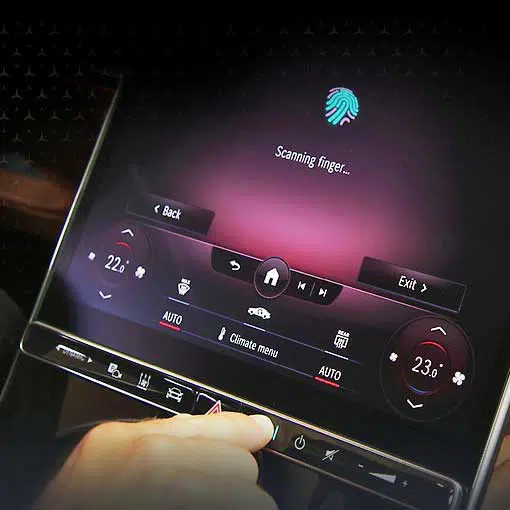Digital payments have been moving to the automobile dashboard for some time, and now the latest development is user authentication. Visa Inc. and the big automaker Daimler AG are planning to launch so-called native in-car payments starting next spring, according to an announcement early Monday.
The new capability will replace authentication based on third-party devices, such as a mobile phone, and will supplant passwords with biometric identification of an authorized user, the companies said. The technology will be available first for Mercedes-Benz automobiles in the United Kingdom and Germany, with other markets in Europe to come later.
The spring launch will involve authentication through a fingerprint sensor, allowing users to make purchases directly on the car’s dashboard head unit or, in the case of Mercedes, through the automaker’s proprietary MBUX system. Mercedes has branded its global payment platform Mercedes pay. Daimler AG is the parent company of Mercedes Benz AG, as well as of Daimler Truck AG and Daimler Mobility AG, the unit heading up the new technology.

“Mercedes pay is our competence center for in-car payment,” said Franz Reiner, chief executive of Daimler Mobility, in a statement. “In partnership with Visa, Daimler aims to offer native in-car payments that meet the requirements of two-factor authentication in a secure and user-friendly way. There is nothing more convenient than authorizing a payment with your fingerprint.”
As part of the initiative, Daimler Mobility will be the first automaker to use the Visa Cloud Token Framework, Visa says. The framework guards and removes private payment data, Visa says, and allows greater flexibility for use with a range of devices. The technology also allows users to avoid entering strings of card numbers or to use a third-party device to prove their identity, Visa says.
“We are excited to bring to life a native solution for in-car payments for the first time, together with our partner Daimler Mobility,” said Anthony Cahill, deputy chief executive and head of European Markets for Visa in Europe, in a statement.
The new technology will support so-called strong customer authentication, as required by the European Union’s Revised Directive on Payment Services (PSD2), Visa says. SCA requires something the user knows or possesses or is part of his or her identity.
In-car payments could be set to take off, according to numbers cited Monday by Visa and Daimler. The number of connected cars will grow to more than 352 million globally, according to Capgemini, while the total of in-car payments is expected to hit roughly $86 billion by 2025, according to Juniper Research.





